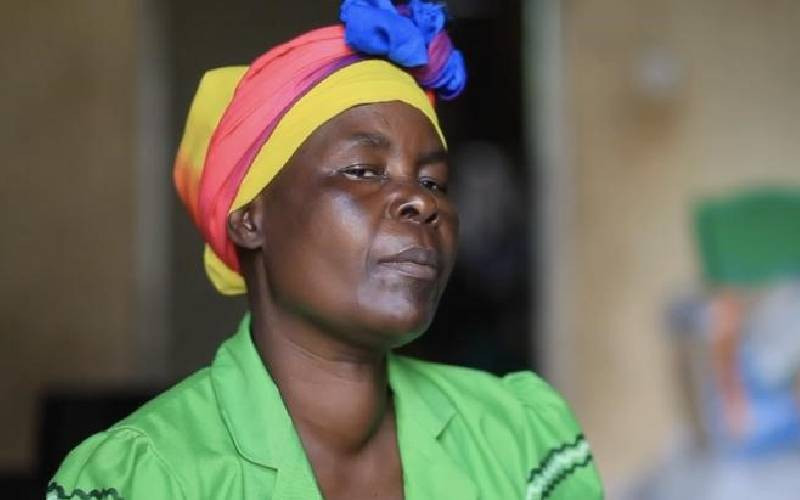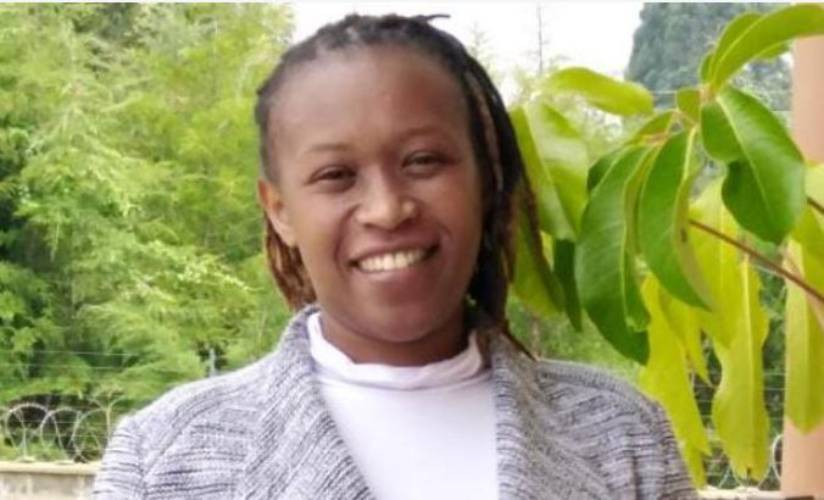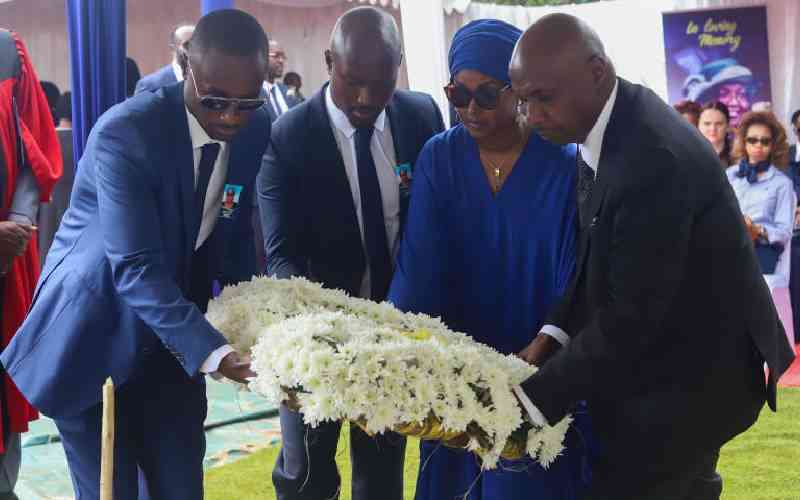Nairobi; Kenya: Kenyans learnt with deep sorrow the passing on of young Emily Chepng’etich, the daughter of Isaac Ruto, the Governor of Bomet County. I take this opportunity, on behalf of myself and my family, to express our very sincere sympathies to Isaac and his family. It has not been, and perhaps it will never be easy for Isaac and his family to accept this loss. We hope and pray that God gives them the strength for their anchor to hold as they weather this storm.
Let me, in the same spirit, congratulate Isaac for proposing to build a cancer centre in memory of his loving daughter. The fact that Deputy President William Ruto and CORD leaders Raila Odinga supported this initiative is highly commendable. Being a cancer victor myself, and knowing other Kenyans who have successfully been treated here and abroad for different type of cancers, our focus must be to prevent future generations from losing their lives unnecessarily due to lack of treatment for this awful disease.
The tragedy, however, is that previous Kenyan governments since independence have not taken this matter seriously. Yet the issue of cancer cannot be left entirely to the private sector. To make advances in cancer treatment three things are vital: public and individual awareness, research and treatment.
It is only through individual and public awareness that we can enhance prevention, and prevention—as you very well know—is better than cure. Changing lifestyle in order to avoid cancer-seeking behavior is only possible if one is aware of the kind of behaviour that predisposes one to cancer. This awareness, very often, comes from the public domain through education, the media and socialisation. Having a clean and safe environment, including avoiding eating food harvested from unsafe environments—like polluted river banks—needs the awareness of public health officials and environment agencies which should safeguard the public from such hazards. These are but a few examples.
It is mainly through research (fact finding, information gathering, getting to know causes of phenomena) that we can know how many cases of cancer we have, what types of cancer prevail in our society, who are likely to get what type of cancer and how to discover treatment. Fortunately there are numerous centres the world over where cancer research has been going on for ages and hence where we can learn what to do. One thing we cannot do, however, is to depend entirely on such places for gaining knowledge on our local cancer problems. We must carry on our research here at home and seek home grown solutions.
I was impressed when I visited Cuba as Minister for Planning and National Development and found out how the Cuba government has done a lot in carrying out research on sugar to discover so many ways of making pharmaceuticals, detergents, vaccines, perfumes, alcohol and fuel from sugar. I then discovered that the agency that sells these products, Labiofam, depends very much on the Cuban Institute of Genetic Engineering and Biotechnology where all the basic research is done before the knowledge is generated for making the various products.
When I was appointed the Minister for Medical Services in 2008, I discovered that one of the major health hazards Kenyans face was cancer. At least 22,000 Kenyans were dying annually due to cancer or cancer-related ailments. Cancer specialists were few, knowledge was scanty, research on cancer was almost non-existent and facilities for treatment were nothing to write home about. I then discovered that the Ministry, together with its parastatal NHIF, had proposed to establish an advanced Medical Centre with some money that NHIF had accumulated over time. As usual in Kenya, this proposal was fraught with controversy and disagreements between the Ministry and service providers. Though a good idea it was likely to fail if left without proper direction and good governance.
I therefore decided, from my earlier Cuban experience, to propose starting with a centre of excellence on Oncology (cancer diagnosis, treatment and care) and Genetic Engineering and Biotechnology. I presented this proposal to the Cabinet in a Cabinet Memorandum. Except for the President, I was surprised that the Cabinet did not show much enthusiasm. One Cabinet Member who is a medical doctor actually told us that “in Kenya we need more health centres and dispensaries and not exotic centres of excellence that the minister is talking about”. In my humble opinion I thought we could do both: chew gum and walk at the same time. My proposal was thrown out. Little did I know that hardly two years later I would be desperately looking for a prostate cancer oncologist to save my life. At great expense and far away from Nairobi I found such a centre of excellence in California USA. Very few Kenyans can get there.
But why biotechnology and genetic engineering? How are these two sciences related to medicine and cancer treatment?
The Kenyan scientist and Harvard Professor Calestous Juma has done a lot of research in this area with special reference to agriculture and crop science. His book, The Gene Hunters, is valuable in this regard. Genetic engineering is the human altering of the genetic material of living cells to make them capable of producing new substances or performing new functions. In each and every cell there is something called the DNA, i.e. that which makes us who we are. The structure of the DNA determines how our cells function and behave, how they will develop and what their tasks will be. Genetic engineering allows scientists to identify specific genes, remove them and clone them so that they can behave and function in “intended or specifically designed ways”.
When this is done successfully scientists are able to use our genes to treat diseases that attack us. In cancer this is very important because cancer cells are simply cells “which have gone rogue” and become cannibals by attacking their fellow cells and neighbours. If you tame them through genetic engineering they will perhaps go back to normal and stop scavenging around. Or they can be frustrated through genetic engineering so that they don’t go anywhere and just stay still. Cells which lack oxygen also tend to go rogue. If through genetic engineering and biotechnology we can produce organic substances which can increase oxygen supply to the cells when introduced into the body then we could easily go a long way to prevent or even treat cancer.
I am speculating; and research begins with speculation. The Centre of Excellence I had proposed to our Cabinet was meant to attract scientists from all over the world to come to Kenya to join us in speculating about cancer diagnosis, treatment and care. But I was turned down because in Kenya, without seeing brick and mortar we think we have no “development”. Developing the mind and our love for fellow human beings is our greatest contribution to development.
 The Standard Group Plc is a
multi-media organization with investments in media platforms spanning newspaper
print operations, television, radio broadcasting, digital and online services. The
Standard Group is recognized as a leading multi-media house in Kenya with a key
influence in matters of national and international interest.
The Standard Group Plc is a
multi-media organization with investments in media platforms spanning newspaper
print operations, television, radio broadcasting, digital and online services. The
Standard Group is recognized as a leading multi-media house in Kenya with a key
influence in matters of national and international interest.
 The Standard Group Plc is a
multi-media organization with investments in media platforms spanning newspaper
print operations, television, radio broadcasting, digital and online services. The
Standard Group is recognized as a leading multi-media house in Kenya with a key
influence in matters of national and international interest.
The Standard Group Plc is a
multi-media organization with investments in media platforms spanning newspaper
print operations, television, radio broadcasting, digital and online services. The
Standard Group is recognized as a leading multi-media house in Kenya with a key
influence in matters of national and international interest.








